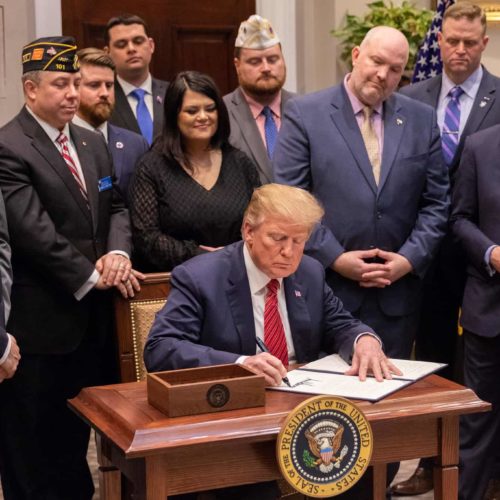Introduction
A Department of Veterans Affairs panel has pushed back against efforts to rush a controversial anti-depression drug into use for its patients, voting not to include the drug, Spravato, on its list of drugs available through prescription at its pharmacies. The VA had been racing to get Spravato ready for patients after President Trump, according to VA sources, urged the agency to buy the Johnson & Johnson drug for treatment-resistant depression. But psychiatrists and medical researchers, including some at the VA, have raised questions about the drug’s effectiveness and safety.
The controversy over Spravato was the subject of a Center for Public Integrity story earlier this week.
The VA’s Medical Advisory Panel, known informally as the “formulary committee,” agreed during a three-day meeting in Chicago not to put the drug on its list of VA-approved medications. According to VA rules, doctors may still order it as a “non-formulary” drug, but they have to explain the reasons the patient needs this specific drug, as opposed to others. In such cases, VA doctors who administer it must do so under strict guidelines, including monitoring patients in a specially-equipped clinic for two hours after infusion.
The “No” vote, which occurred Thursday, is likely to be a blow to Janssen Pharmaceuticals, the drug’s maker, and its parent, Johnson & Johnson, which hopes Spravato will be a $600 million blockbuster by 2022. An inclusion in the VA’s formulary — the list of drugs that are available at VA pharmacies — would provide a stamp of approval from an agency known for its caution and care in drug selection. “For an entity as large as the VA to consider putting any drug on its formulary is a big deal, and if it gets on it’s a home run for Johnson & Johnson,” said Wesley Boyd, a practicing psychiatrist and associate professor at Harvard Medical School, before the vote was taken. Neither Janssen nor Johnson & Johnson responded to requests for comment.
Despite claims by Janssen and the FDA that the drug is fast and effective, some psychiatrists said they had concerns about balancing the drug’s effectiveness against its dangers. Questions have been raised about the protocols of the drug’s clinical trials, the FDA’s speedy approval process, and the known effects of the drug – dissociation (an out of body experience), dizziness, sedation, and heightened blood pressure. In the drug’s trials, three people who had taken it committed suicide and three others died — as opposed to none on placebos — though the FDA and Janssen said there was no evidence the drug and the deaths were linked.
Some psychiatrists and researchers also questioned whether the clinical trials showed that the drug was effective in males and geriatrics. “In the company’s studies, Spravato was shown to have a very slight benefit for patients in general, but not for men or people over 65,” said Diana Zuckerman, president of the National Center for Health Research in Washington, D.C. “Given those findings, Spravato is very unlikely to help most veterans using the VA and so it absolutely should not be included on the formulary, and it is good news that the vote agreed with the scientific evidence,” she added.
Inside the VA, the formulary vote may be more symbolic than meaningful, as psychiatrists say the actual use of the drug at the agency may be limited because of the hurdles involved: If they order the drug off-formulary, doctors have to fill out paperwork demonstrating that similar formulary-listed drugs won’t work or would be unsafe for the patient. Clinics must have heart and respiratory monitoring equipment available, and be prepared to deal with patients’ showing abnormal behavior – thus only a limited number of clinics can administer the drug. The patient has to stay in the clinic for observation, and cannot drive for 24 hours after treatment.
Outside the VA the vote could have more significance. Medical insurers have their own formulary lists of the drugs they cover, and may look to the VA for guidance in making up their own lists. If a drug is not on the VA formulary, they could decide not to put it on theirs, meaning they will not cover it, and that might have implications for the drug’s sales.
The VA chose to cast the formulary decision in a positive light: “After reviewing the available published evidence regarding the safety and effectiveness of esketamine (Spravato), a team of VA clinicians approved on June 20 the use of esketamine (Spravato) on a non-formulary basis. This process is similar to ‘prior authorization’ formulary designations used in non-VA health care systems, and will enable VA psychiatrists to offer esketamine to patients when clinically indicated,” said a VA statement. It said the medications will be prioritized for veterans “who have not previously responded to adequate trials of other available treatments for major depression.”
The FDA approved the drug March 5, setting aside its usual rules for anti-depressant approval and accepting one short-term trial instead of the usual two. Within 48 hours, VA sources said they were hearing that President Trump thought the drug would be terrific for their agency and they were told to get the first patient treated within 90 days of the drug’s availability. How the president learned about the drug is not clear, but emails obtained by ProPublica show that as the drug was being developed three Trump friends from his Mar-a-Lago social club were working with Johnson & Johnson and the VA on veterans’ depression and suicide issues. And on June 12, in a meeting with VA Secretary Robert Wilkie, Trump touted Spravato’s “incredible” effectiveness and offered to help the VA negotiate its buy, Bloomberg reported.
This week’s Center report on those events brought a strong statement from House Veterans Affairs Committee Chairman Mark Takano on June 18: “I am incredibly alarmed by reporting today that suggests Spravato, a controversial new drug, is being rushed through critical reviews and may be prescribed to veterans before fully vetting the potential risks and benefits.”
Takano’s office said he will be sending a letter to the VA demanding documents about the drug’s review and contracting processes, to help him assess the extent to which the White House or the Mar-a-Lago trio might have attempted to pressure VA to push this drug to veterans.
Outside the VA, some say the drug’s cost may be an issue. Janssen has said its list price will be between $590 and $885 per dose, and in most cases two doses a week will be prescribed. That would bring the cost of Spravato in the first month of treatment to $4,720 to $6,785. Subsequently, assuming the treatments drop to once a week as is likely, the annual cost for the drug alone would run from about $30,000 to $46,000. There will be additional costs, as protocols suggest that it be used in combination with another anti-depressant and it has to be administered as part of an office visit. It is not yet clear how much of this cost might be covered by insurance companies.
Read more in Money and Democracy
Money and Democracy
A Republican wants old campaign cash to fund his nonprofit. A Democrat might show the way.
Tom Price could find comfort from Heidi Heitkamp.
Money and Democracy
What second-quarter fundraising can tell us about 2020
Presidential campaign finance disclosures help gauge candidate viability and voter enthusiasm.



Join the conversation
Show Comments